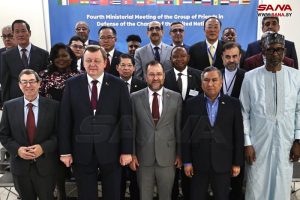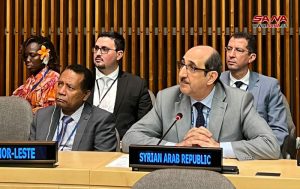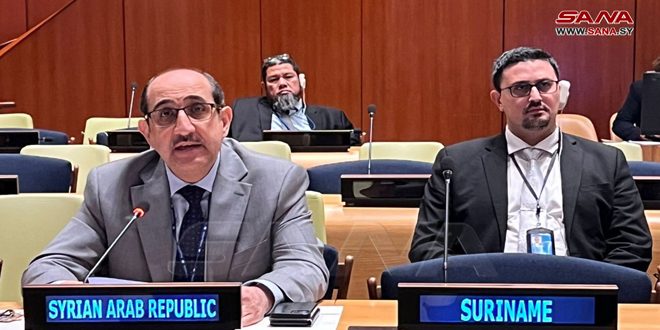Group of Friends in Defense of the Charter of the United Nations adopts declarations on coercive measures, food security and decolonization
New York, (ST) – The countries of the Group of Friends in Defense of the Charter of the United Nations, including Syria, adopted at their ministerial meeting a political declaration and three special declarations on unilateral coercive measures, food security, decolonization and modern colonial practices.
The Head of the delegation of the Syrian Arab Republic to the work of the 78th session of the United Nations General Assembly, Ambassador Bassam Sabbagh stressed in his speech during the meeting the importance of the joint work of this group to confront attempts to undermine the Charter of the United Nations by some Western countries, in addition to the necessity of highlighting the catastrophic effects of the inhumane and immoral unilateral coercive measures imposed on the Syrian people, affecting all aspects of daily life.
It is noteworthy that the Group of Friends in Defense of the Charter was established in 2021, and currently includes 20 countries from various geographical groups around the world, including Syria, the Russian Federation, China, Iran, Cuba, Palestine, Venezuela, Algeria and other countries, with the aim of preserving and defending the United Nations Charter.
 In a related context, Ambassador Sabbagh in a speech before the 47th ministerial meeting of the Group of 77 and China stressed the necessity of reforming international financial institutions, especially the World Bank and the International Monetary Fund, involving developing countries in their decision-making, and providing effective and predictable financing to all those who deserve it without politicization, and in a manner that it ensures fairness in the dealings of international financial institutions with the countries of the group.
In a related context, Ambassador Sabbagh in a speech before the 47th ministerial meeting of the Group of 77 and China stressed the necessity of reforming international financial institutions, especially the World Bank and the International Monetary Fund, involving developing countries in their decision-making, and providing effective and predictable financing to all those who deserve it without politicization, and in a manner that it ensures fairness in the dealings of international financial institutions with the countries of the group.
On the other hand, in preparation for the meetings of the Conference of States Parties to the United Nations Framework Convention on Climate Change (COP28), scheduled to be held in Dubai, United Arab Emirates next November, ministerial consultations were held on financing arrangements to respond to losses and damages arising from the effects of climate change.This happened through the establishment and activation of the Loss and Damage Fund mechanism that was decided to be established during the Conference of the Parties (COP27) in Sharm El-Sheikh, Egypt, which aims to compensate countries affected by the negative phenomena resulting from climate change.
In his intervention during the meeting, Ambassador Sabbagh renewed Syria’s support for the decision to establish the Fund. He stressed the need for developed countries to fulfill their international obligations towards developing countries, especially regarding providing adequate and integrated financing for losses and damages, in accordance with specific and measurable commitments, in addition to ensuring support for all developing countries with financing and transferring Technology and capacity strengthening.
Ambassador Sabbagh also stressed the importance of having a fundamental role for developing countries in managing the Fund, and for its resources to be available to all affected countries without politicizing or excluding anyone, in a way that ensures achieving climate justice for all developing countries most affected by climate change phenomena.
 A high-level meeting was also held on combating tuberculosis with the participation of the delegation of the Syrian Arab Republic, where Ambassador Bassam Sabbagh said in his speech that Syria had made great strides in combating this disease through many initiatives, including the implementation of the national program to combat tuberculosis in Syria, which led to reducing tuberculosis infection rates from 86 to 23 per 100,000 individuals between 1990 and 2006.
A high-level meeting was also held on combating tuberculosis with the participation of the delegation of the Syrian Arab Republic, where Ambassador Bassam Sabbagh said in his speech that Syria had made great strides in combating this disease through many initiatives, including the implementation of the national program to combat tuberculosis in Syria, which led to reducing tuberculosis infection rates from 86 to 23 per 100,000 individuals between 1990 and 2006.
Sabbagh stated that an important part of these gains that were achieved were lost, due to the terrorist war imposed on Syria during the past decade, as well as due to the unilateral, illegal and inhumane coercive measures imposed by the United States of America and the European Union on important sectors, including the health sector, which negatively affected this sector and preventing the achievement of sustainable development goals.
Ambassador Sabbagh called for support for national efforts to combat tuberculosis, including the immediate lifting of unilateral sanctions on the health sector and allowing the transfer of vaccines, treatments and necessary technologies without obstacles. He said that controlling tuberculosis constitutes a major challenge in many parts of the world.
Raghda Sawas

